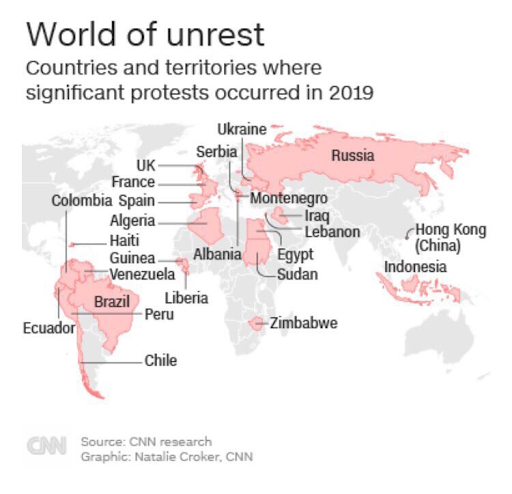Social unrest seems to be cropping up all over the world, from Hong Kong to Bolivia and Lebanon; we offer up a 3 variable model to help explain why. The inputs: urbanization, income inequality, and average age. Every country currently seeing mass protests has some combination of high levels of the first two and lower readings for the last. This admitted crude measure also explains why many developed countries’ political environments also seem so fraught at the moment.

Long-time readers may recall I occasionally take strange vacations. Over the last 30 years, I have been all over Syria, Lebanon, and most recently Afghanistan in 2013. I once drove around rural Turkey for a week just taking in the sights. It wasn’t until we encountered an army checkpoint outside a small village that questions about safety popped up.
Curiosity is the only reason I can offer for these offbeat excursions. It’s one thing to read about troubled countries, but once you get there you see the universal truth that travels always illuminates. People are pretty much the same everywhere.
Since there seems to be an outbreak of global protest at the moment, these are the subject of this week’s Story Time Thursday. A partial list of the countries in question:
- Bolivia
- Chile
- Ecuador
- Haiti
- Hong Kong
- Lebanon
Much of the news commentary around these events center on country-specific issues, but I see 3 threads that weave through most or all of them: urbanization, income inequality, and average age. Perhaps that’s just my own worldview that “people are the same everywhere”, but let’s see how far it takes us in explaining current events.
Here is the percent of each country that lives in/around cities using World Bank urbanization data:
- Bolivia: 69%
- Chile: 88%
- Ecuador: 64%
- Haiti: 55%
- Hong Kong: 100%
- Lebanon: 89%
- All are well above the global urbanization rate of 55%.
And here is the Gini coefficient by country from the CIA World Factbook (the higher the number, the greater the income inequality):
- Bolivia: 47.0
- Chile: 50.5
- Ecuador: 45.9
- Haiti: 60.8
- Hong Kong: 53.9
- Lebanon: 31.8
- Most are above the global median Gini coefficient of 37.9, and I can tell you that Beirut is as unequal as any western city so perhaps Lebanon’s official number is incorrect.
Finally, here is the average age of each country, also from CIA data:
- Bolivia: 24.6 years
- Chile: 34.8
- Ecuador: 28.1
- Haiti: 23.3
- Hong Kong: 44.8
- Lebanon: 30.5
- The majority are at or below the global median age by country of 31.0.
The logic behind why these measures indicate a potential for unrest:
- Urbanization rates quantify the concentration of citizens in urban areas and how easily they might gather for protests. They are also essentially a proxy for the “network effect” of people’s ability to connect with each other face to face.
- Income inequality makes it more likely for a population to protest against what they see as a ruling elite.
- As for average age, history shows younger people are more likely to take to the streets.
We can even make a crude model for how these inputs might interrelate. Add the urbanization rate and Gini coefficient and divide by average age and you get:
- Bolivia: 4.7
- Chile: 4.0
- Ecuador: 3.9
- Haiti: 5.0
- Hong Kong: 3.4
- Lebanon: 4.0
- The global “social unrest indicator” sits at 3.0, well below all 6 countries
You’re probably wondering how the US and other major economies rank and, despite the fact that our simple model leaves out important inputs like a history of democratic institutions and the rule of law, we won’t leave you hanging:
- United States: 3.3. Urbanization at 82%, Gini of 45.0, the average age of 38.2
- Germany: 2.2. Urbanization at 77%, Gini of 27.0, the average age of 47.4
- China: 2.8. Urbanization at 59%, Gini of 46.5, the average age of 37.7
- United Kingdom: 2.8. Urbanization at 83%, Gini at 32.4, the average age of 40.5
- Brazil: 4.2. Urbanization at 87%, Gini at 49.0, the average age of 32.4
One can tell an infinite number of stories about how these metrics inform each country’s proclivity for unpredictable political outcomes even if they don’t rise to the perilous levels of the 6 countries we highlighted. In the interest of respecting your time, I will leave you to develop those narratives for yourself.
Summing up: as investors, we are trained to look for common patterns that explain outcomes and that is what this exercise tries to accomplish when it comes to country-specific political events. Language and culture may vary, but people are essentially the same everywhere.
Sources: World Bank urbanization rates: https://data.worldbank.org/indicator/SP.URB.TOTL.in.zs
CIA Factbook Gini coefficients: https://www.cia.gov/library/publications/the-world-factbook/rankorder/2172rank.html
CIA Factbook median age: https://www.cia.gov/library/publications/the-world-factbook/fields/343rank.html
StevieRay Hansen
Editor, Bankster Crime
MY MISSION IS NOT TO CONVINCE YOU, ONLY TO INFORM YOU…
The Birth Pains Are Growing Stronger….
“Unless God has raised you up for this very thing, you will be worn out by the opposition of man and devils”…
My name is Steve Meyers and I need to share a vision and warning that the Lord showed me back in April 2007….
Many of you will ask why I waited so long to share the warning. I didn’t. I shared the story with everyone that would listen from pastors to friends to family to colleagues. Immediately following the initial vision, I called a close friend. I told him to sit down that I had something to tell him. I needed it documented as I knew this was supernatural and from God. As I witness events unfolding today, I need to share the vision again.
The risk of loss in trading futures and options on futures can be substantial. The author does not guarantee the accuracy of the above information, although it is believed that the sources are reliable and the information accurate. The author assumes no liability or responsibility for direct or indirect, special, consequential or incidental damages or for any other damages relating or arising out of any action taken as a result of any information or advice contained in this commentary. The author disclaims any express or implied liability or responsibility for any action taken, which is solely at the liability and responsibility of the user.

![]()



